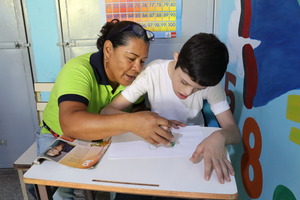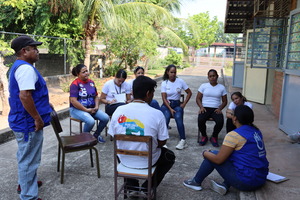share

Rogxana Pérez running an awareness session at the school. | © M. Campos / HI
In Venezuela, HI is providing psychosocial support to teachers and students with disabilities.
In the municipality of Átures, HI is working in Dr. Walter Loureiro school, where there is a special section for children and adolescents with cognitive disabilities. HI’s teams provide psychosocial support to help the pupils, their families, their teachers and all the school’s employees to cope with their sometimes stressful or emotionally charged daily lives.
 The school caters for 99 children and teenagers aged between 3 and 15 with various types of cognitive disability. Many of them come from very poor homes. Indeed, families with children with disabilities are at greater risk of economic vulnerability, as the care required for their children's health and well-being is often expensive. Veriuska Vásquez, 27, an art teacher at Dr. Walter Loureiro School, sees this every day:
The school caters for 99 children and teenagers aged between 3 and 15 with various types of cognitive disability. Many of them come from very poor homes. Indeed, families with children with disabilities are at greater risk of economic vulnerability, as the care required for their children's health and well-being is often expensive. Veriuska Vásquez, 27, an art teacher at Dr. Walter Loureiro School, sees this every day:
"The children often come to school on canteen days, because many of them have nothing to eat at home. But we only have enough food for them four days a month, and the meal they have here will be the only one that day... Sometimes, with the teaching team, we go out and buy food for them, although we have nothing to eat at home either.”
Veriuska also notes that many parents do not accept the fact that their children have a disability, especially when it is a cognitive disability, which is often invisible. It is only at school that these children receive teaching and education; the rest of the time, they remain shut away at home, without care or attention.
"We are confronted with so many situations that overwhelm us, but we mustn’t take it out on our students. That's why we appreciate HI's presence at school, the fact that we are listened to and offered support sessions to help us stay healthy," explains Veriuska.
 Rogxana Pérez, HI’s mental health and psychosocial support officer, visits Dr. Walter Loureiro school twice a week to provide the teachers with a space where they can express themselves and share experiences. She also runs activities for the children to help them share their emotions and feelings.
Rogxana Pérez, HI’s mental health and psychosocial support officer, visits Dr. Walter Loureiro school twice a week to provide the teachers with a space where they can express themselves and share experiences. She also runs activities for the children to help them share their emotions and feelings.
"We love it when Rogxana comes to see us, because she listens to us and gives us tools to help us manage our emotions. She brings volunteers with her and organises activities for the children. She helps us to unload our emotions and makes our lives easier," says Veriuska.
Veriuska has found her vocation and, with the support of HI, she is intent on continuing despite the difficulties. She is still driven by the same passion, convinced that this is where she can make a difference.
"We come to work because of our vocation and our love for these children. Once they reach the age of 15, we steer them towards vocational training so they can learn a trade and find a job. In fact, one of our colleagues is a former pupil who is now an assistant. She is living proof that working with these children and investing in their future actually pays off and has a positive effect on the whole community.”
In Átures, HI also offers psychosocial support to the residents and employees of the Casa Hogar los Abuelos retirement home. In addition, to prevent the outbreak and spread of water-borne diseases, HI teams raise awareness of good hygiene practices, such as hand washing with soap.








HI is an independent and impartial aid organisation working in situations of poverty and exclusion, conflict and disaster. We work alongside people with disabilities and vulnerable populations, taking action and bearing witness in order to respond to their essential needs, improve their living conditions and promote respect for their dignity and fundamental rights.
HI is an independent and impartial aid organisation working in situations of poverty and exclusion, conflict and disaster. We work alongside people with disabilities and vulnerable populations, taking action and bearing witness in order to respond to their essential needs, improve their living conditions and promote respect for their dignity and fundamental rights.